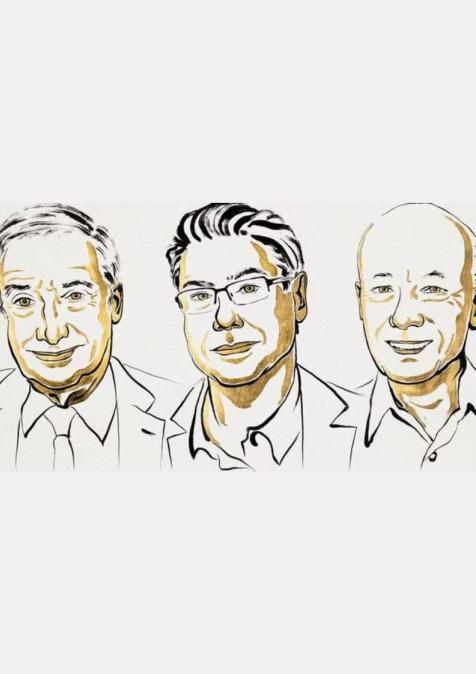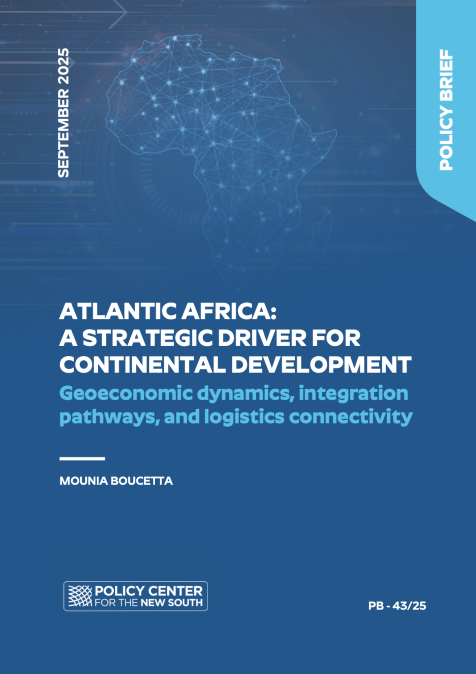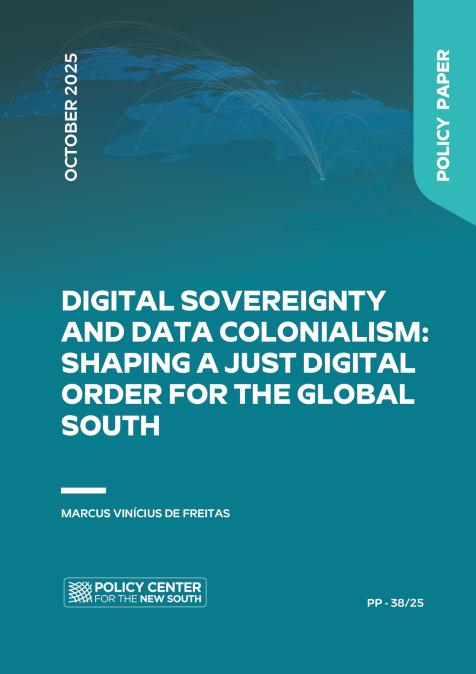Président
- Fathallah Oualalou, Senior Fellow, Policy Center for the New South (PCNS)
Introduction
- Kevin Cleaver, ancien vice-président associé, Fonds international de développement agricole (FIDA)
Intervenants
- Jennifer Blanke, Vice-présidente, Fondation Syngenta pour l'agriculture durable (SFSA)
- Bambang Brodjonegoro, président du conseil des commissaires, Bukalapak et PT Telkom
- Nguyen Minh Hang, vice-ministre des affaires étrangères, Vietnam
- Megumi Muto, vice-président de l'Agence japonaise de coopération internationale (JICA)
- Cecilia Nahón, directrice exécutive suppléante, Groupe de la Banque mondiale, Argentine
RELATED CONTENT
-
 AuthorsOctober 22, 2025This blog was originaly published on orfonline.org. The maritime cities of the 21st century are not merely legacies of the industrial age. Rather, they are becoming platforms of global connectivity and engines of economic transformation. As global trade shifts toward digital platforms and multimodal logistics, the traditional harbour is transforming into a 'Blue City' - a modern coastal centre where trade finance, service industries, and skilled workers are considered as k ...
AuthorsOctober 22, 2025This blog was originaly published on orfonline.org. The maritime cities of the 21st century are not merely legacies of the industrial age. Rather, they are becoming platforms of global connectivity and engines of economic transformation. As global trade shifts toward digital platforms and multimodal logistics, the traditional harbour is transforming into a 'Blue City' - a modern coastal centre where trade finance, service industries, and skilled workers are considered as k ... -
Jodie Keane, Helmut SorgeOctober 17, 2025Jodie Keane, Principal Research Fellow at the International Economic Development Group, discusses how green trade measures are transforming African economies, stressing the need for faire ...
-
 AuthorsOctober 15, 2025Depuis que l’économie a été reconnue par les Nobel, en1969, c’est à cette discipline qu’il revient de clore les cérémonies annuelles d’attribution des Prix aux lauréats. Pour cette année 2025, c’est le 13 octobre que l’Américano-Israélien, Joel Mokyr, le Français, Philippe Aghion, et le Canadien, Peter Howitt, ont été consacrés Prix Nobel de l’Économie. ...
AuthorsOctober 15, 2025Depuis que l’économie a été reconnue par les Nobel, en1969, c’est à cette discipline qu’il revient de clore les cérémonies annuelles d’attribution des Prix aux lauréats. Pour cette année 2025, c’est le 13 octobre que l’Américano-Israélien, Joel Mokyr, le Français, Philippe Aghion, et le Canadien, Peter Howitt, ont été consacrés Prix Nobel de l’Économie. ... -
Hung Q. Tran & Oumayma BourhribaOctober 10, 2025This episode of the Policy Center for the New South Podcast features Dr. Hung Q.Tran, Senior Fellow, discussing the tokenization of money and its impact on the global financial system. He ...
-
October 9, 2025Dans cet ouvrage, Professeur Mohamed Benabid propose une analyse rigoureuse d’un phénomène devenu structurel, révélateur des fragilités démocratiques et institutionnelles. Loin des discours simplistes, l’ouvrage articule dimensions cognitives, technologiques, juridiques et éducatives po...
-
AuthorsJorge ArbacheOctober 9, 2025Conventional wisdom holds that the United States has undergone massive deindustrialization in recent decades, with the country's manufacturing sector supposedly withering as it lost ground to China. This narrative has fueled debates about industrial policy, economic nationalism, and the reshoring of manufacturing production. But what if this story is only partially true? What if, instead of disappearing, American industry simply changed its address? ...
-
AuthorsOctober 7, 2025Africa's development depends on the mobilization of catalytic levers capable of accelerating growth momentum, with wider benefits for the African people. The digital, energy and demographic transitions are all major challenges, but at the same time they present the continent with new opportunities for transformation. In this context, Atlantic Africa appears to be a strategic and promising area, thanks to the richness and diversity of its natural resources, its geographical position ...
-
October 7, 2025Global economic growth has been more resilient than expected, as the artificial intelligence-led growth seems to be compensating for the negative impacts of trade conflicts. Overstretched asset values and slowing jobs growth may be signaling that the balanced crossing of those two paths...
-
AuthorsOctober 3, 2025This policy paper examines digital colonialism as a defining structural challenge of the twenty-first century and argues for the urgent pursuit of digital sovereignty in the Global South. While digitalization holds immense potential to foster inclusion and bridge development gaps, current dynamics reproduce historical patterns of dependency: data is extracted from Southern populations, routed through infrastructures owned by Northern corporations, processed by algorithms trained on ...
-
AuthorsOctober 3, 2025Global economic growth has been more resilient than expected, as the artificial intelligence-led growth seems to be compensating for the negative impacts of trade conflicts. Overstretched asset values and slowing jobs growth may be signaling that the balanced crossing of those two paths will be challenged. ...







